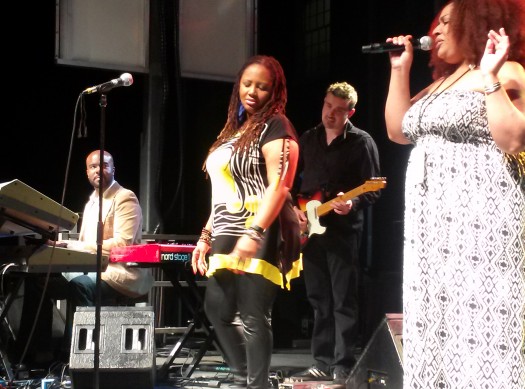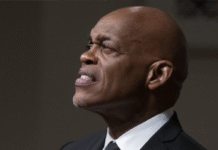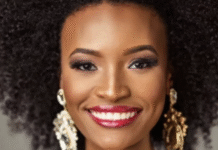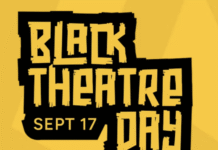
Lalah Hathaway is blessed to have both strong musical genes and a one-of-a-kind loyal following. The sultry tenor and eldest daughter of late Grammy award-winning singer/musician Donny Hathaway has released six critically acclaimed albums over a career now spanning 25 years.
Lalah’s soothing vocals venture into pop, R&B, gospel, rock and jazz. She has collaborated with a prism of musicians and performers but is deeply rooted in soul music. “I’m all over the map, but it’s made me a well-rounded artist…the artist I’m supposed to be,” she says. “I have a lot of different places I can go. It’s more important to have a good song than it is to be the songwriter. My voice is naturally low. The high part of my voice is not experienced, so I don’t abuse my instrument. I recognize who I am.”
Joking that her middle name is “Donny Hathaway’s daughter,” Lalah was this year’s guest performer at Clark Atlanta University’s (CAU) Jazz Under the Stars benefit concert. Her performance, including a surprise appearance by singer Anita Baker, was part of an effort to raise funds for CAU Guild, which supports the HBCU’s cultural and performing arts programming. “Music and art cannot be exaggerated,” says a relaxed Lalah, also a classically trained Berklee College of Music alumnae. “It improves cognitive learning skills, and it’s amazing that it’s not included the same way as arithmetic is in the curriculum. It’s as important as math and science. It just makes you a well-rounded person.”
The day prior to showtime, a warm Lalah gave a master class for some of CAU’s music students. The songstress with autumn-hued dreadlocks chose to sit facing the audience rather than use the podium. The radiant singer thrives in open discussions. “I want this to be more of a dialogue,” says Lalah as she takes the microphone from the stand. “My experience has been very unique. I’m a born musician and a life student of music.”
Lalah spent the early part of her talk reflecting on her appearance at this year’s International Jazz Day in Osaka, Japan. Actively posting pictures and videos to her Instagram account, the Chicago native is still in awe about performing alongside musicians like Wayne Shorter, Herbie Hancock, Roy Hargrove, Pete Escovedo, Jonathan Butler and Marcus Miller.
“The experience of being around so much music always lifts me up and reminds me that I’m going for that greatness,” says Lalah. “I stay inspired. I learn every time I’m with them. It’s just wonderful!” For the remainder of her time at the festival, a mesmerized Lalah had sacred chats with Sheila E., Terri Lyne Carrington, Esperanza Spalding and Dee Dee Bridgewaterabout being a female in the music industry.
“Those moments sweep away a multitude of bad gigs. I was a kid in a candy store,” says Lalah. “I particularly cherish those moments I get to spend with those girls. They are friends of mine. I don’t think of myself as a jazz singer, so I feel very lucky. It feeds me. You don’t get those opportunities a lot as a student.”
It also dawned on Lalah after her master class that she forgot to share her experiences touring with Prince. “There are very few people that I’m geeky about, and he’s one of ‘em,” she says. “It was a dream of my life growing up in the ‘80s to be able to look at him as a personality, an icon but first as a musician. To be able to open for him and to sing with him was surreal. It was crazy. Do you see how lucky I am?”
Lalah was joined midway through her talk by her two background vocalists. She addressed some of the challenges she faced in the music business. Following the release of her self-titled debut LP, Lalah was asked in an interview with iconic radio and video host Donnie Simpson about her favorite singers. The vocalist named mostly female jazz singers. Her label executives didn’t take her responses lightly.
They assembled a meeting to give her coaching on who she should name in future interviews and who she should like. Admitting that her initial goal was to be “a producer’s dream,” Lalah has since taken full control of her destiny. “The music industry is not designed for you to be successful,” says Lalah. “Music is designed to make you feel successful. There was always a push to get me to do something that wasn’t natural. It didn’t always feel good, but I realized the music industry was a separate entity from my passion, which is music.”
Lalah adds, “Soul music will never die. We have to keep pushing. It’s still our story, but it’s just very narrow. You gotta keep pushing on even if it won’t always be met with commercial success.” The performer suggested also that the young musicians take the initiative to find the strengths in their musical crafts. “Figure out the best places for you to go,” she says. “If you’re trying to learn your range, be gentle with it. Be on pitch. Have tone and good interpretation. You have to get on your path and stay on it because nobody can deter you.”
It took some convincing, but Lalah delivered an incredible impromptu performance singing and playing the Steinway piano. She admits she gets nervous because she doesn’t practice playing much. “Experienced as I am, I still learn something everyday,” says Lalah. “Understand what you want your instrument to do. I block myself from my blessings sometimes. Even though I try to teach people not to do it, we all do that. Sometimes you have to push in the direction you’re supposed to go in.”
Great things continue to happen to Lalah. Earlier this year, she was awarded her very first Grammy along with fusion band Snarky Puppy in the “Best R&B Performance” category for “Something.” She still hasn’t received her coveted trophy but remains extremely humbled by the accolade. “It’s the most surreal experience in the world,” says Lalah. “It’s an honor, but it’s just another thing. It was a great moment to get one for a song I recorded so long ago. A Grammy is a bonus on top of everything else I wanted to do.”
Lalah plans to record a live album featuring more of her playing piano. She hopes to also land collaborations with Pharrell, Timbaland and Sting. The performer also still manages to always find something new in her father’s compositions.
Since Donny Hathaway’s untimely passing in 1979, Lalah knows his music has greatly impacted generations of performers and listeners. There’s a lot Lalah can’t explain in words, but she scratches the surface when she explains how his legacy continues to influence her work. “It’s been an evolution understanding my daddy and understanding myself,” she says. “A lot of that has to do with that honest vulnerability and empathy that is missing everywhere in the world. I’m learning more of that as an adult.”
This post was written by Christopher A. Daniel, pop cultural critic and music editor for The Burton Wire. He is also a contributing writer for Urban Lux Magazine and Blues & Soul Magazine. Follow Christopher @Journalistorian on Twitter.
Like The Burton Wire on Facebook. Follow us on Twitter @TheBurtonWire.








